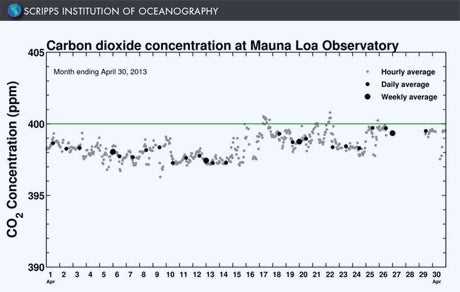 Last week, the Scripps Institution of Oceanography released data showing that CO2 atmospheric levels had briefly passed 400 parts per million (ppm) and were close to surpassing that level for sustained periods of time. This is bad news. At 450 ppm, scientists anticipate the world will be 2 degrees Celsius warmer than pre-industrial times, and world leaders have agreed that’s a point of dangerous consequences.
Last week, the Scripps Institution of Oceanography released data showing that CO2 atmospheric levels had briefly passed 400 parts per million (ppm) and were close to surpassing that level for sustained periods of time. This is bad news. At 450 ppm, scientists anticipate the world will be 2 degrees Celsius warmer than pre-industrial times, and world leaders have agreed that’s a point of dangerous consequences.
Along with this grim news came important new research findings from Professor V. Ramanathan of the Scripps Institution at the University of California, San Diego, and other researchers regarding short-lived climate pollutants – black carbon, methane tropospheric ozone and some hydrofluorocarbons (HFCs). While we continue – and must continue – to hammer away at reducing CO2 emissions, their work supports the argument that also reducing these short-lived climate pollutants (SLCPs) can have an immediate effect on slowing warming and the resulting sea-level rise.
In the World Bank-commissioned report Turn Down the Heat: Why a 4°C Warmer World Must Be Avoided, scientists laid out how the world is currently on track for a 4°C warmer world by the turn of this century, with devastating consequences for development. Under a business as usual scenario, we don't know exactly when we will reach 2 degrees, but science increasingly tells us that it is the decisions taken this decade that will really matter.
Aggressive action to reduce SLCPs, especially black carbon emissions, currently unregulated at the international level, can slow the advent of 2 degrees while we also work to lower CO2 emissions. From our perspective, this is critically important as it buys our clients, developing countries, especially the poorest and most vulnerable, critical time. Slowing warming as it heads toward 2 degrees and understanding the impacts of black carbon on sea level rise in particular would be essential for island states. For them, half a meter stands between survival and devastation.
For these reasons, the Bank is committed to working with a coalition of the working that has come together around short lived climate pollutants, the Climate and Clean Air Coalition, with a particular focus in our own work now and what we can do to spur reductions in black carbon emissions and other SLCPs like methane.
Of course it’s not just a climate issue. For many, black carbon, first and foremost, is a health issue. Easily inhaled into the lungs from indoor cooking fires and from industrial and vehicle pollution, it contributes to asthma and other health problems. The benefits of reducing black carbon are immediately evident in health care costs and productivity gains.
Ramping up our work to reduce black carbon along with the ongoing fight to reduce greenhouse gas emissions to stop climate change can provide immediate, near-term and local benefits from action now, as well as long-term, public goods.
Rachel Kyte
Vice President for Sustainable Development
www.worldbank.org/sustainabledevelopment
Twitter: @rkyte365


Join the Conversation